Wherein we revisit our first week’s reading of The Old Curiosity Shop (Week 30 of the Dickens Chronological Reading Club); with a summary and discussion wrap-up; and a look-ahead to Week Two.
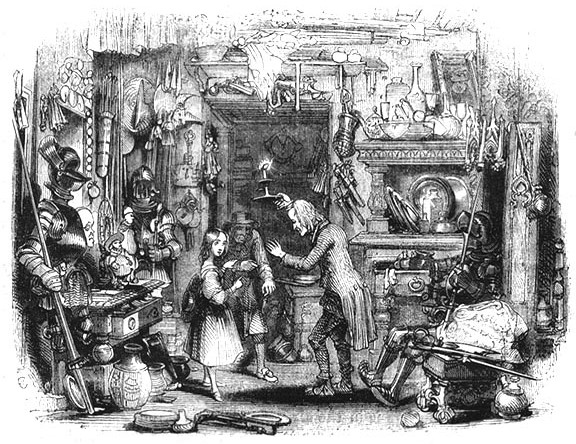
Edited/compiled by Rach
“I had, ever before me the old dark murky rooms—the gaunt suits of mail with their ghostly silent air— the faces all awry, grinning from wood and stone—the dust, and rust, and worm that lives in wood—and alone in the midst of all this lumber and decay and ugly age, the beautiful child in her gentle slumber, smiling through her light and sunny dreams…”
Friends, we’ve entered the Dream-world Pilgrims’ Progress that is The Old Curiosity Shop, filled with its vestiges of the past, its ogres and lost children, and the many strange beings our pilgrims meet upon the road.
We’ve had some great discussion starting out! But first, here are some quick links and notes:
- General Mems
- The Old Curiosity Shop, Week One (Chs. 1-18): A Summary
- Discussion Wrap-Up
- A Special Gift (Thank you, Dr. Christian!)
- A Look-Ahead to Week Two of The Old Curiosity Shop
General Mems
Friends, if you’ve not had a chance to read Boze’s marvelous piece on Dickens’ whimsical Holiday Romance, I’d very much recommend it!
If you’re counting, today is day 210 (and week 31) in our #DickensClub! It will be Week Two of The Old Curiosity Shop, our sixth read of the group. Please feel free to comment below this post for the second week’s chapters, or use the hashtag #DickensClub if you’re commenting on twitter.
No matter where you’re at in the reading process, a huge “thank you” for reading along with us. Heartfelt thanks to our dear Dickens Fellowship and The Dickens Society for retweets, and to all those liking, sharing, and encouraging our Club, including Dr. Christian Lehmann and Dr. Pete Orford. Huge “thank you” also to The Circumlocution Office (on twitter also!) for providing such a marvelous online resource for us.
And for any more recent members or for those who might be interested in joining: the revised two-and-a-half year reading schedule can be found here. Boze’s marvelous Introduction to Master Humphrey’s Clock and The Old Curiosity Shop can be found here. If you’ve been reading along with us but aren’t yet on the Member List, we would love to add you! Please feel free to message Rach here on the site, or on twitter.
The Old Curiosity Shop, Week One (Chs. 1-18): A Summary
We begin our story with an unnamed gentleman (Master Humphrey) encountering, during one of his night walks, a girl who has lost her way in the maze of London. This is our heroine, “Little Nell.” Master Humphrey assists Nell to find her way back home to the curiosity shop full of odd, sometimes grotesque, items, vestiges of past times.
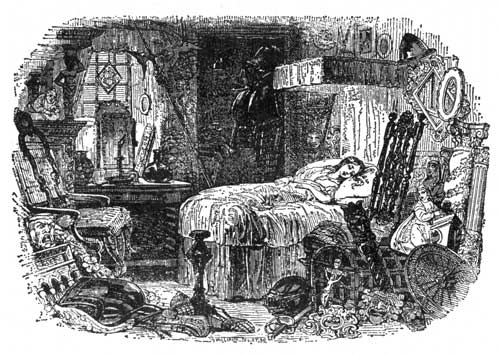
“If these helps to my fancy had all been wanting, and I had been forced to imagine her in a common chamber, with nothing unusual or uncouth in its appearance, it is very probable that I should have been less impressed with her strange and solitary state. As it was, she seemed to exist in a kind of allegory…”
Master Humphrey questions Nell’s grandfather—her only caretaker and companion, besides the shock-haired and amusing friend, Kit, who does odd jobs for them and takes lessons from Nell—about the advisability of allowing someone so young to brave the streets alone at night in London. The grandfather becomes immediately defensive, assuring the gentleman that Nell wishes to do these errands for him, and that it is nothing.
We come to learn, along with Master Humphrey, that the grandfather also leaves Nell alone in this curiosity shop at night, while he is out on some mysterious errand, of which a certain taint of guilt and shame is notable. There is some dark secret behind it, Master Humphrey fears. It is clear that the grandfather loves Nell dearly, and vice-versa; but still, the secrecy and strangeness of the child’s situation, surrounded by so much that is opposite to her, is troubling. (We find out later that faithful Kit has been remaining outside on the nights when Nell is left home alone, to keep an eye on her from a distance.)

We soon encounter the short, ogrish Quilp, a landlord and moneylender of violent and cruel temperament, sarcastic and rapacious.
Quilp keeps his wife sitting up all night watching him smoke cigars purely for the fun of it; he keeps both her and her mother in fear of their lives and under his thumb. Quilp has some vague intention to make Nell the second Mrs Quilp after his wife dies–a frightening idea for any number of reasons, not the least of which is that Nell is fourteen, and his wife is a young woman.
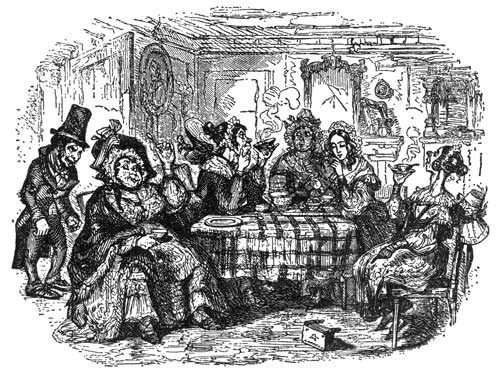

We quickly learn that the grandfather has been borrowing money from Quilp for a mysterious purpose.
However, there is an understanding that the grandfather is secretly rich, hoarding his wealth miserly so that he can bestow it all on Nell at his death.
With this understanding, Nell’s ne’er-do-well brother, Fred, who is out of the grandfather’s good graces, comes up with a scheme to get his friend, the careless, dissipated, and entertaining Dick Swiveller, to engage himself to his sister Nell once she is old enough, thereby ensuring that Dick—and, through him, Fred too—will partake of Nell’s wealth from her grandfather.
Dick is already interested in Sophia Wackles, who is coming up with a scheme of her own to arouse Dick’s jealousy and make Dick finally declare his love and propose to her. This ends up benefitting Dick’s own purpose to have some grounds for an argument with Sophia and to break off their connection, which he does.
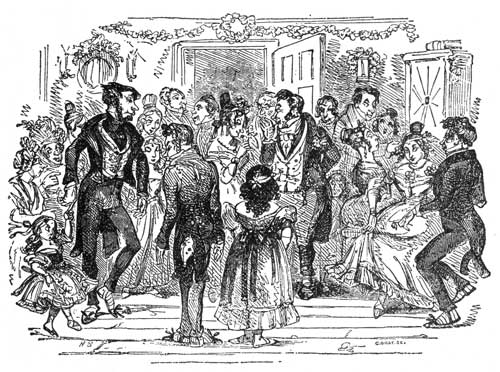
Meanwhile, as Nell comes to see Quilp on an errand for her grandfather–the purpose of which, the loan of more money, she is unaware of–Quilp continues to delay giving a response, intending to find out information about what the grandfather is doing with all of this loaned money.

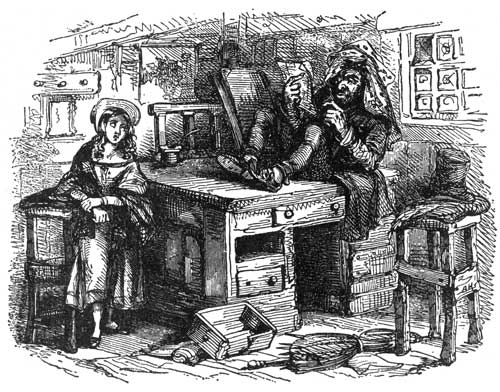
Quilp has schemed with his wife, tenderhearted as she is, but weakened by her violent husband, to get into Nell’s confidence to try and suss out the secret of her grandfather’s wealth. Little as Nell understands herself, she unburdens her heart about her worry for her grandfather, who has been depriving himself of rest in order to be gone all night on some mysterious purpose that causes a morbid fixation and anxiety in him. He has changed; as has the whole atmosphere of a home she once found warm and loving.

(Nell told her grandfather that she would rather leave the city altogether and go begging into the country, rather than lead a life of trouble and anxiety such as theirs has come to.)
The conversation between Nell and Mrs. Quilp gives Quilp the clue he needed, and he confronts the grandfather with it: he has been gambling all of his money away every night; he has no stash of hidden wealth after all. This proves to be correct, and the grandfather cannot persuade Quilp to lend him more money in spite of the conviction that this time it will be different. The grandfather hopes by this gambling to secure Nell’s future comfort, and avoid the fate to which Nell’s mother was a victim in her poverty.
“I would spare her the miseries that brought her mother, my own dear child, to an early grave. I would leave her— not with resources which could be easily spent or squandered away, but with what would place her beyond the reach of want for ever.”
To add insult to injury, Quilp accuses Kit of being the one who disclosed the grandfather’s secret to him.
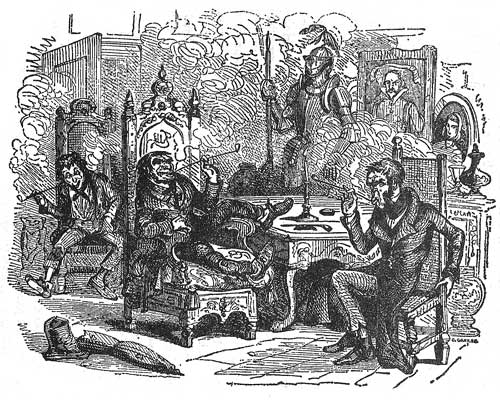
The grandfather falls ill for some weeks, and is furious with Kit and will not allow him near, the reason for which neither Kit nor Nell understand. Nell comes to Kit to give him his wages and tell him that he has done something to upset her grandfather.
During the grandfather’s illness—the only reason he is allowed to stay at his own home now—Quilp takes possession of the Shop and everything in it, with the aid of the lawyer Mr. Brass, as the grandfather has no means of paying Quilp back for his previous loans.
Kit offers Nell and her grandfather a place in his own home, which touches Nell deeply. But as the grandfather recovers, he and Nell decide to sneak away before anyone suspects they’ve gone, leaving the city to seek peace in the quieter places.

“Let us walk through country places, and sleep in fields and under trees, and never think of money again, or anything that can make you sad, but rest at nights, and have the sun and wind upon our faces in the day, and thank God together! Let us never set foot in dark rooms or melancholy houses, any more, but wander up and down wherever we like to go; and when you are tired, you shall stop to rest in the pleasantest place that we can find, and I will go and beg for both.”

When Quilp and Dick Swiveller—who has come to pay a visit and check on the grandfather—discover that they have gone, they both suspect that the grandfather has some secret fortune stored elsewhere, which would, they feel, explain his sudden disappearance.

Meanwhile, Kit finds other employment with the kindly Garlands (Mr and Mrs Garland, and their son, Abel), who overpay him due to lack of change, not expecting Kit to come back and work off the rest.
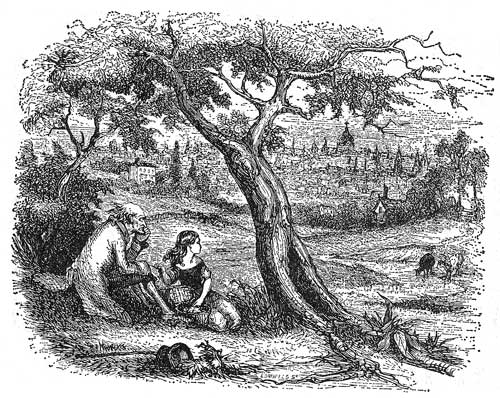
Nell and her grandfather encounter kind cottagers who offer them refreshment and direction to a good stopping-place on their journey; they encounter two traveling showmen—Tommy and Short—repairing their Punch-and-Judy-style puppets, and decide to stay the night at the same lodgings, as the grandfather seems quite taken with these new companions.
Meanwhile, Nell sews her emergency gold coin into her dress, to use only as a last resort, when all the rest of their scant money runs out. The next day, Nell and the grandfather decide to accompany the traveling showmen for a while longer. We later find out that both men—Short and Tommy—harbor some suspicions about the pair, and decide that, if there is a reward for finding these two runaways, they will split it.
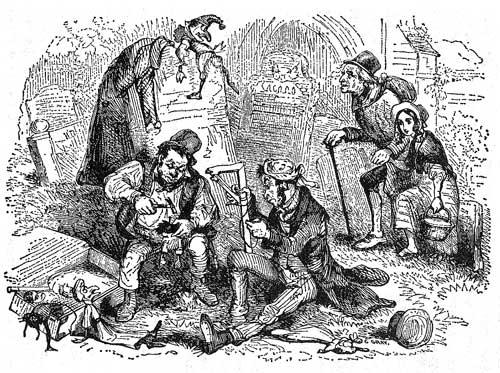
“Punch in the Churchyard,” by Phiz. https://www.charlesdickenspage.com/illustrations-curiosity-shop.html 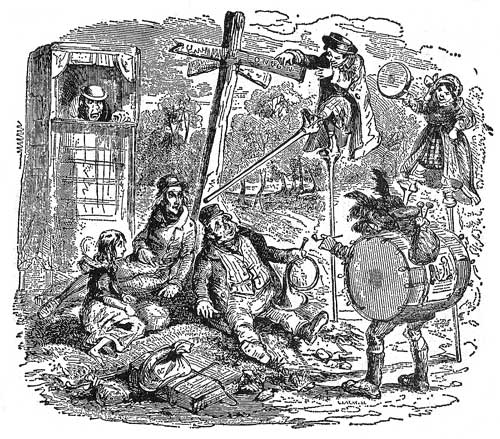
Discussion Wrap-Up
What We Loved — and Didn’t
Cassandra reflects on reading Master Humphey’s Clock, and found herself right in between the contrasting perspectives that we’ve recently shared: she enjoyed the experiment and found some of it tough-going…
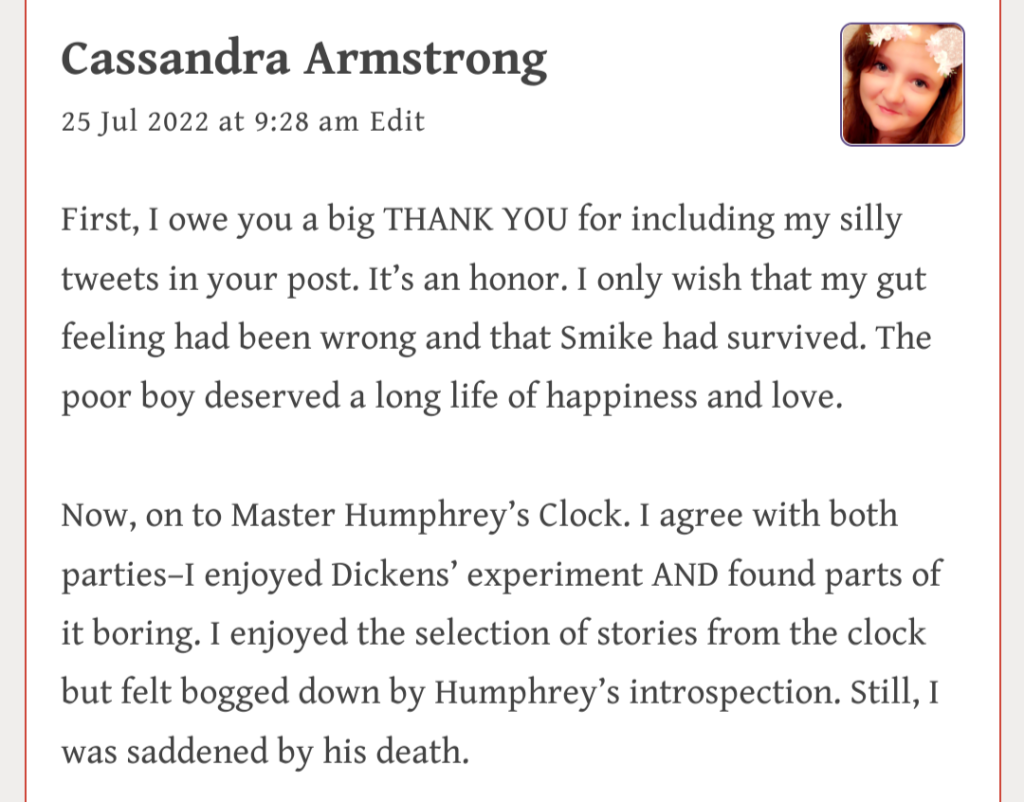
The Stationmaster starts us out with some of the things he doesn’t enjoy about the Shop, followed by some quotes that he especially liked:
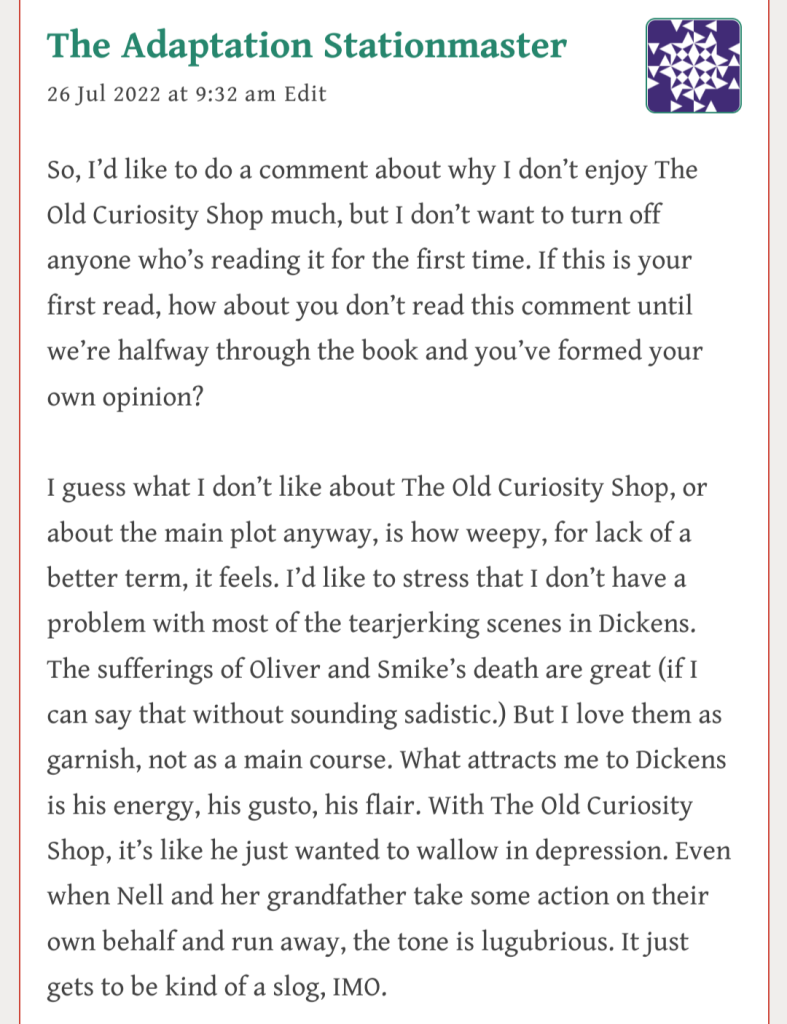
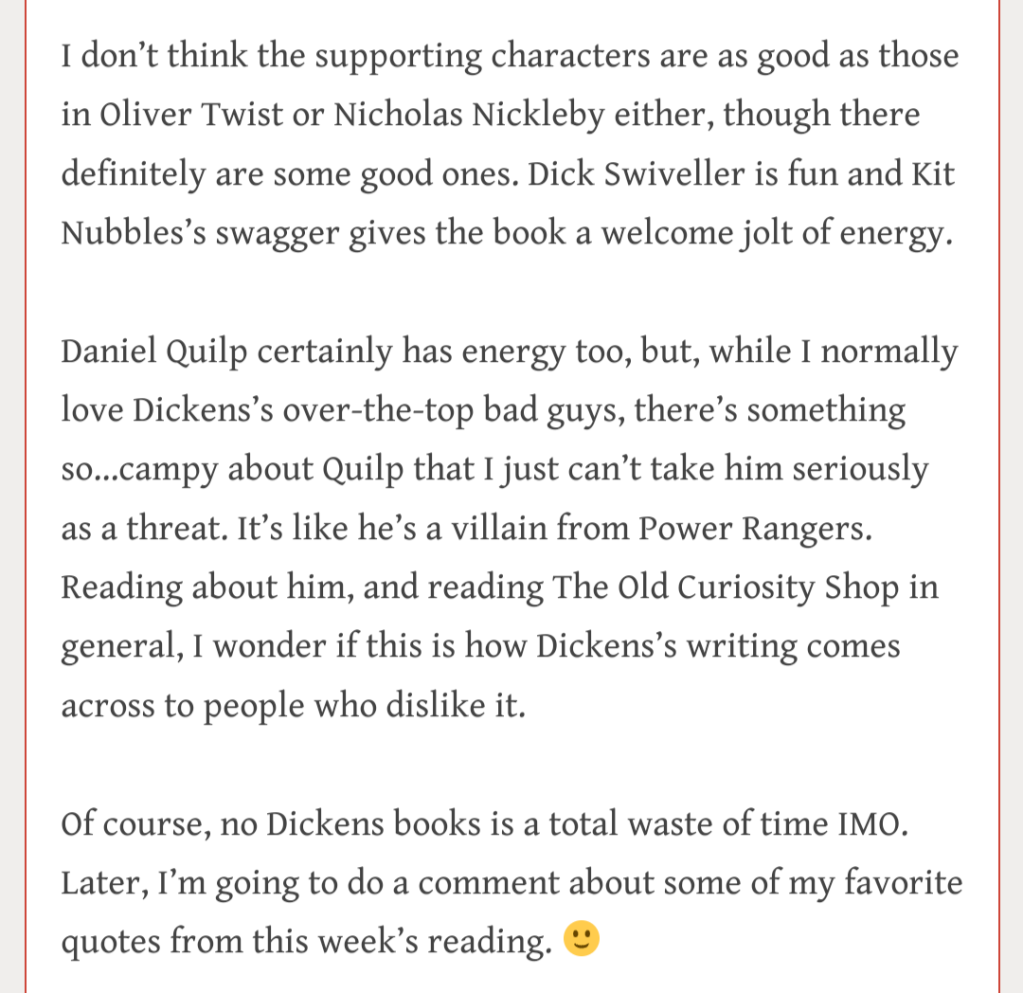
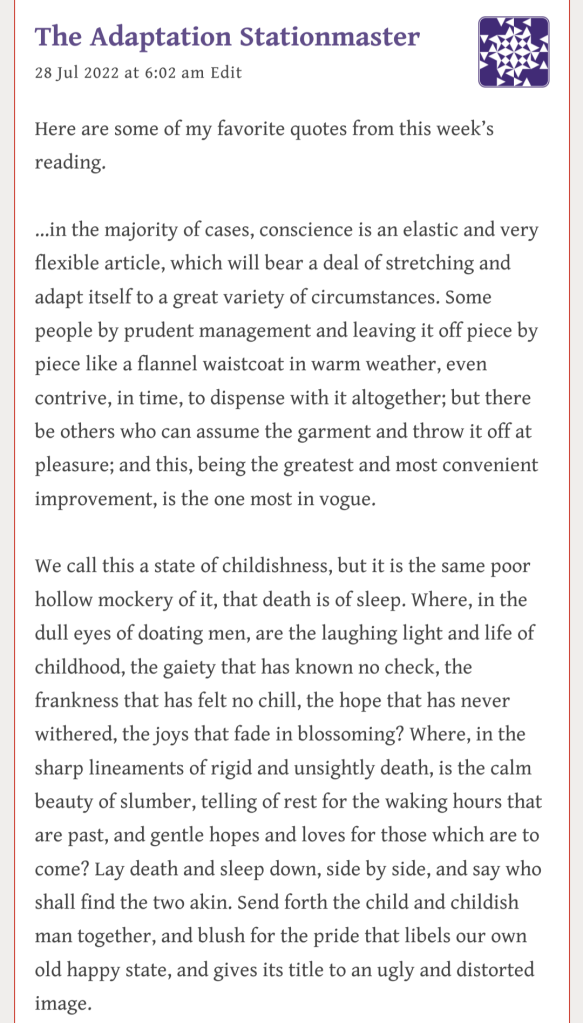

Dickens’ “Writing Lab”: Contrasts; Exploring Childhood as a “Special State”; Sentimentality; “To Leave Something Always in Suspense”
Chris reflects beautifully on what has helped her to get through what has sometimes felt like a “tedious” journey: Dickens’ ability to engage the world from a child’s perspective and a situation of “contrasts” (not unlike, as she writes, the situation of the young Victoria):

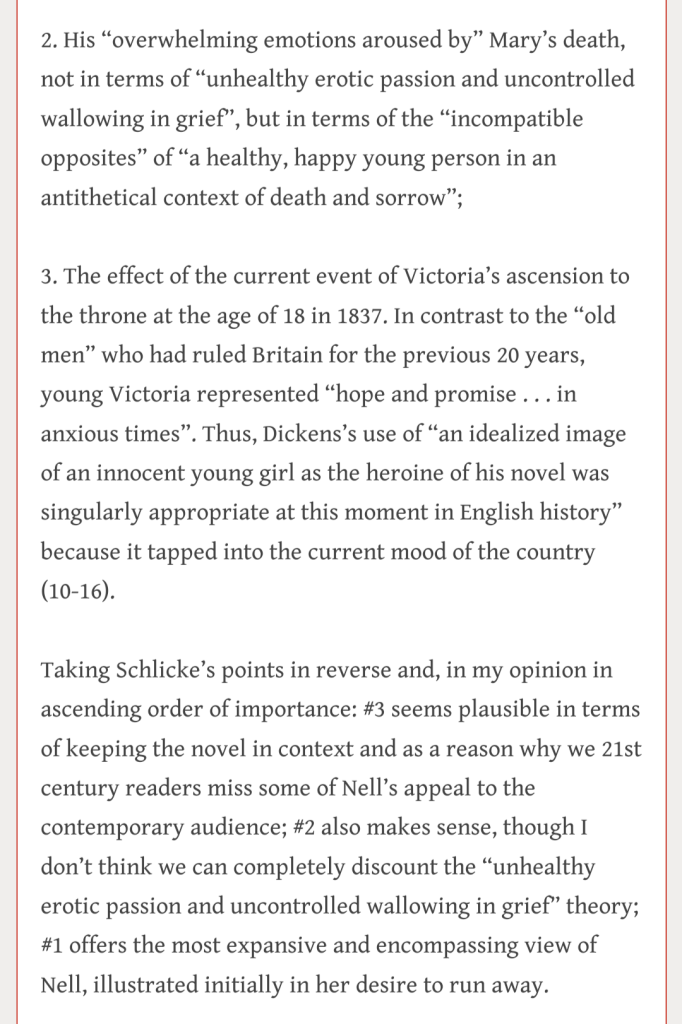
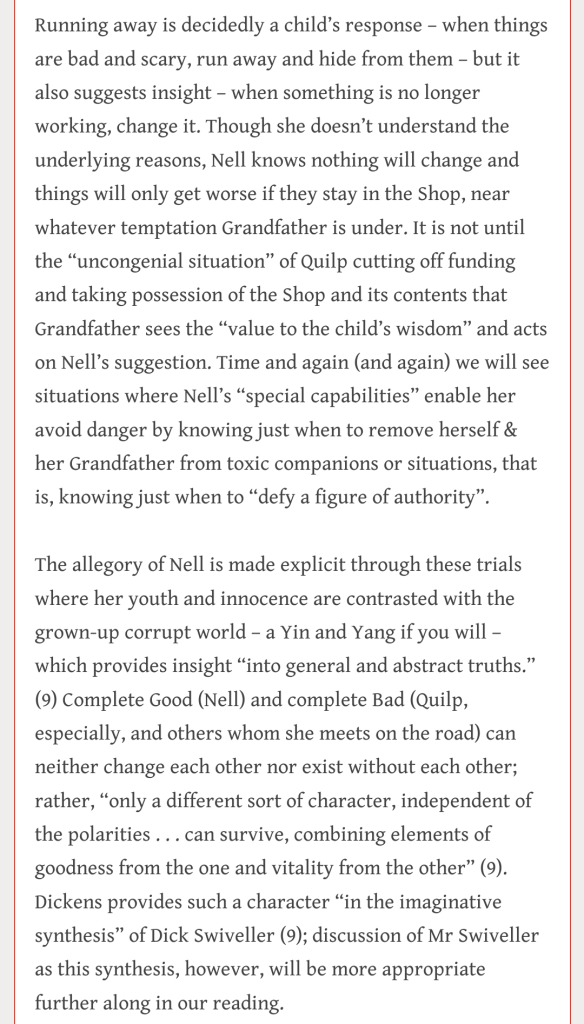

Boze responds, reflecting on Dickens’ ability as a writer to “perceive and indulge public tastes while being entirely unaffected by them”:
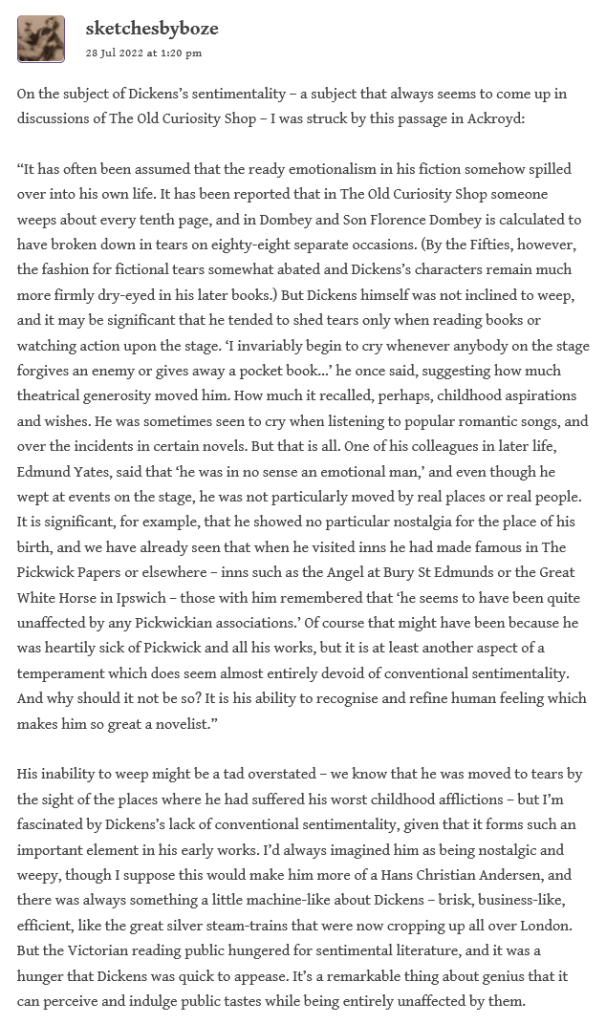
Lenny had a similar response to Chris in his earlier engagement with the Shop, but he is enamored during this read, “totally caught up in Nell’s picaresque journey”:
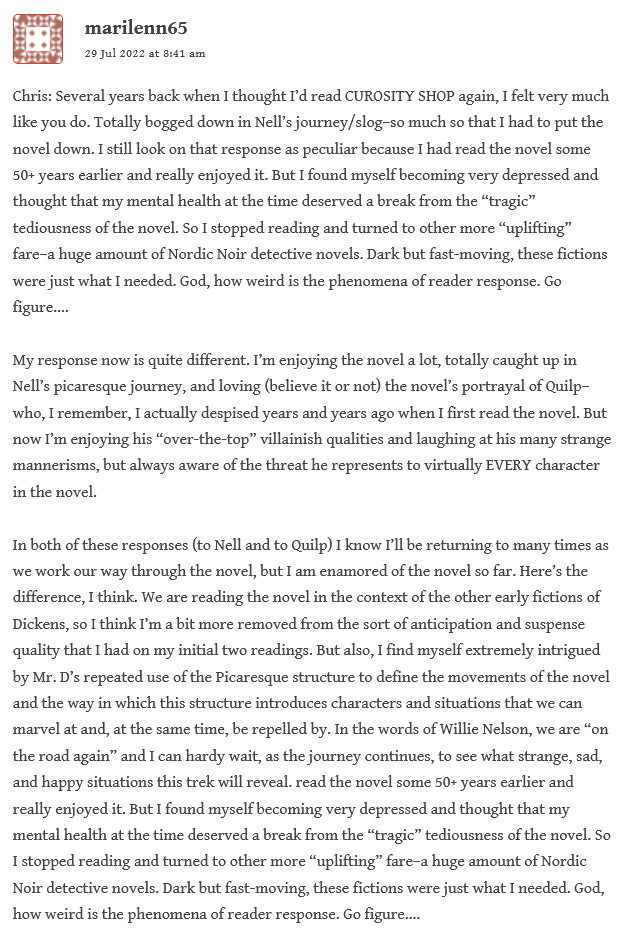
Marnie, too, finds Nell more touching than she would have anticipated:
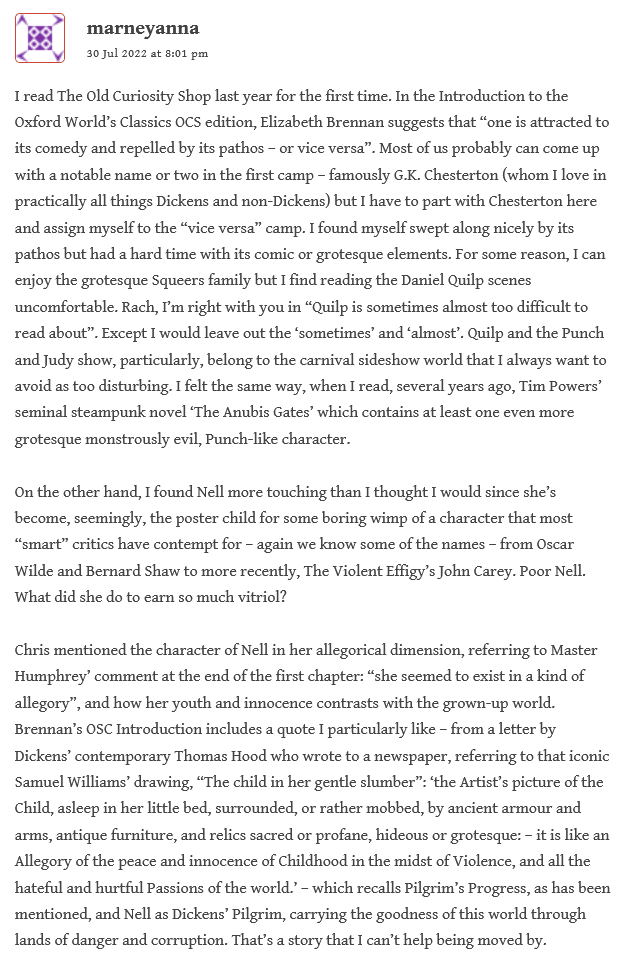
Boze brings in a marvelous quote from Barnaby Rudge, and how the means by which cults draw followers is not unlike the process of the successful writer:
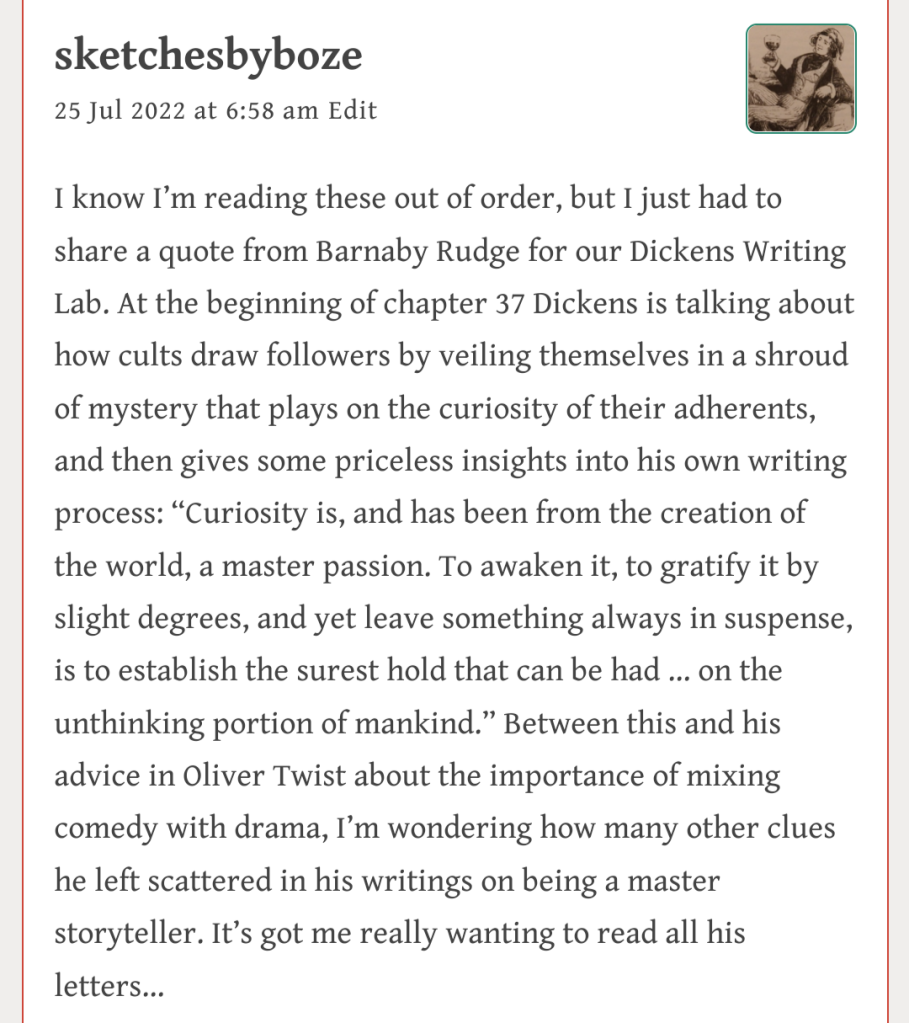
Addiction
Might it be said that, due to her grandfather’s nightly secret habit, Nell is a “child of addition”? The grandfather means well, but he is consumed by this unreality of something coming from a gambling habit that has only been draining their resources, leaving them at the mercy of Quilp and leaving Nell to the mercy of the London streets and the dangers of the world.
My own alarm was very much expressed by Master Humphrey:
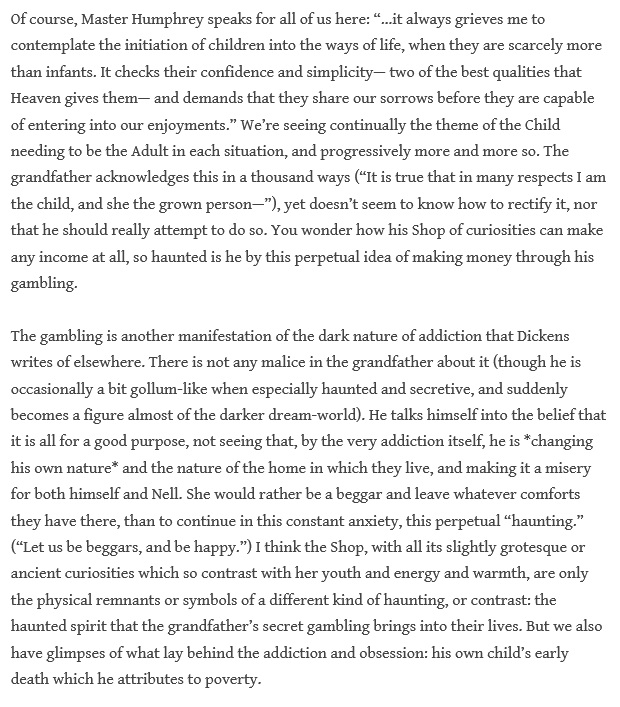
But while we might be alarmed by the danger Nell is put into regularly, both in her perpetual anxiety that she tries to hide and the danger of walking in London alone at night, there is another perspective on taking on adult responsibility so young: it can be maturing and affirming, too. Here’s a lovely take from Marnie on the realism of the situation, and the self-confidence that can spring from such necessity:
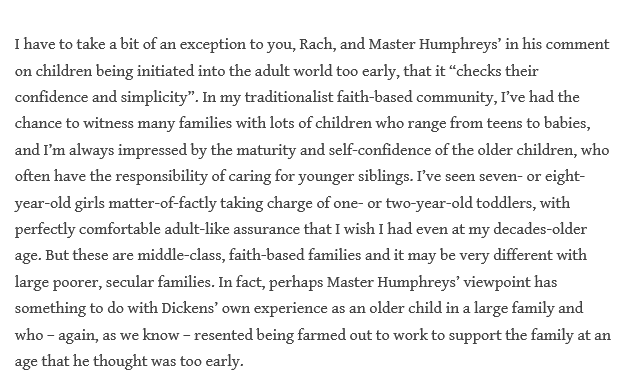
City versus Country; Dickens’ Romanticism; Dickens’ “Most Wordsworthian Novel”?
I couldn’t help but bring us back to our recurring theme of the perception of the “City” versus the “Country”:

Here, Lenny brings us back beautifully to Dickens’ Romanticism, which has been an ongoing theme. His early response is that The Old Curiosity Shop might even be Dickens’ most Wordsworthian novel yet! That perhaps the “fairy-tale” quality of it is more akin to Wordsworth’s grappling of psychological realities, his “unknown modes of being”:


Ogres and the “Dream-world”: Fairy Tale or Reality?
How do we look at The Old Curiosity Shop: Is it a kind of modern fairy tale (the Child journeying against a world of ogres, surrounded by contrasts and strangeness), or is it hyper-realism?
The Stationmaster talks about Quilp:

I was struck by the constant references to the “Dream-world” and the fairy tale metaphors, especially after having read Boze’s introduction, while I’m in the midst of Harry Stone’s The Night Side of Dickens:
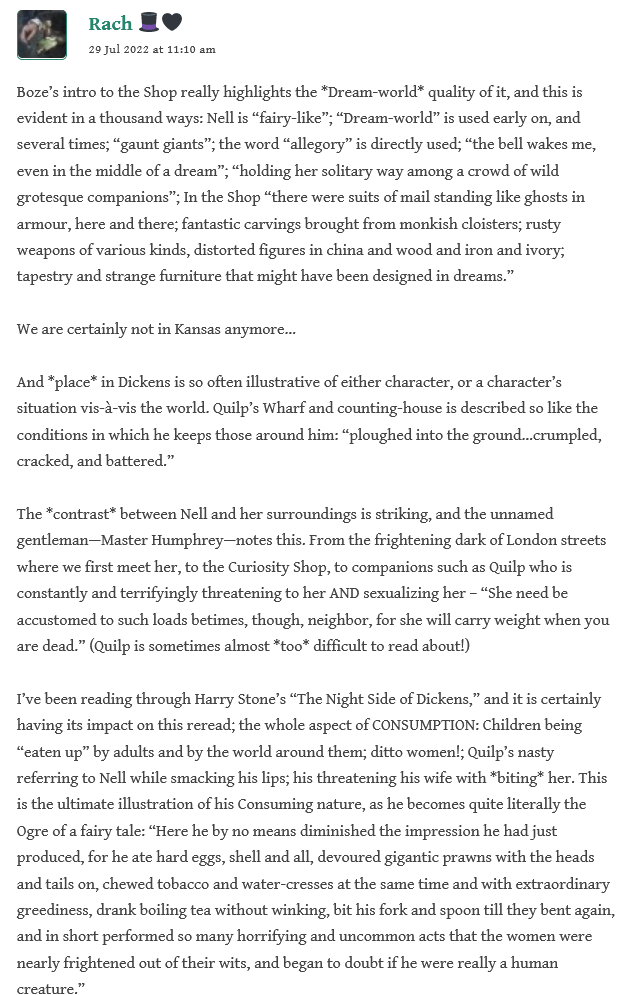
Lenny, however, brings up a wonderful alternate perspective: Quilp not so much as “ogre” as contemporary sharp-practicing businessman. He is struck by “the psychological and social realism” portrayed here, and its modernism; by the child’s ability to step in “and fill the gaps left by the ‘missing’ parent or parents.” Perhaps this might be looked at as a kind of hyper-realism, after all:
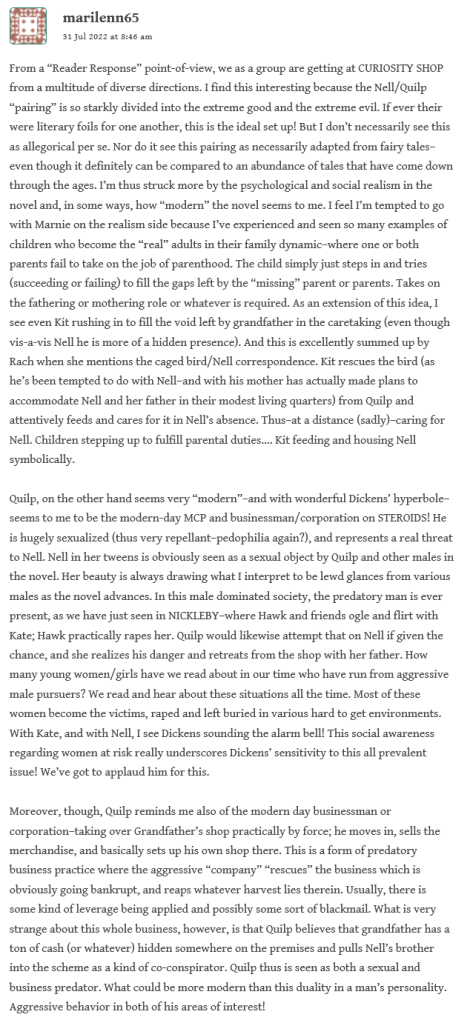
And Marnie adds to this beautifully:
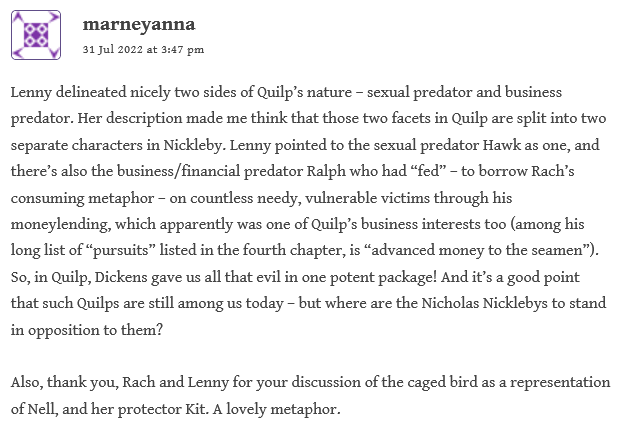
A Special Gift (Thank you, Dr. Christian!)
Friends, I just thought I’d share this amazing gift from our Dickens Club supporter and encourager, Dr. Christian Lehmann…a first edition of a Master Humphrey installment(!!), and a beautiful character sketch (and a very French-looking interpretation) of Sydney Carton by Claud Lovat Fraser! (I’m really falling down the rabbit hole looking at other character sketches of Fraser’s!) Thank you so much, Dr. Christian. What a treasure.
A Look-Ahead to Week Two of The Old Curiosity Shop
Friends, this week we’ll be reading Chapters 19-37.
If you’d like to read it online, The Old Curiosity Shop can be found at The Circumlocution Office. There are a number of places (including Gutenberg) where it can be downloaded for free.


Is the part in Chapter 19 about giants in “freakshows” having to wait on dwarfs and stay out of public sight based on the real living conditions of such people? Was it more social critique on Dickens’s part? Or did he just make it up? Or was it true but he wasn’t necessarily doing social critique, just adding some color?
People generally think of Little Nell as a passive victim (I wouldn’t necessarily mind if she was; Smike is a passive victim and he’s great), but it’s worth noting that she quickly figures out that Codlin is really not her friend and how to evade him. (Not that he’s the most subtle person in the world.) I like to think that if Dickens hadn’t been in such a glum mood when he was writing her story, Little Nell could have come out on top like Oliver Twist did.
The prostitute in the carriage (I assume she’s a prostitute) who tries to help Nell because she doesn’t want her to end up like herself is a type that will return in Dickens. She reappears briefly in Little Dorrit and more substantially in David Copperfield. I forgot she was in this book though.
I wasn’t planning on commenting again until the end of the book, but a lot of stuff has occurred to me so far.
LikeLiked by 2 people
Stationmaster: keep writing about the things that occur to you; it’s always great to hear your opinions and ideas. You’re actively responding to the novel in a dynamic way and often mention ideas that others will have missed or merely glossed over. For example, your contrast between the levels of passivity in Nell and Smike is intriguing, to say the least. They both are “wounded” children stuck, for the most part in conditions that are far from ideal. Nicholas, though, becomes Smike’s protector and caretaker whereas Nell has no real partner (in this regard)–pretty much at the mercy of her grandfather who seems to go through up and down patches of dementia, depression and mania. Smike seems to “grow” with the relationship he has with Nicholas, whereas Nell, in spite of her willingness to survive and “thrive” with her protectorship of her grandfather, has no real help (is constantly dealing with her grandfather’s whims) and has virtually no means or strength to deal with his compulsive gambling mania. Her only growth, so far, exists in her constantly inventing new ways to cope with or obstruct his behavior. (We applaud her for this….) So, understandably, She is totally at sea, here–as many modern day partners are with their significant others dealing with the same problem. Once again, Dickens shows how psychologically aware he is of these particular social/individual problems–as well as the difficulties of handling what we now call, today, bipolar behavior.
After having written this, I’m not so sure we CAN label her a “passive” character, after all. She’s just at the mercy of a baffling problem that, were she a modern day “adult”–would be still dealing with in whatever ways she could, with, hopefully, the help of an experienced practitioner.
AS to Oliver–there’s a whole new idea in this context–one that we’ll no doubt tackle as a group, I hope
LikeLiked by 1 person
Thank you for your kind words. I guess I’d say that Nell is a proactive character or a character who tries to be proactive, but the universe is out to get her so that it doesn’t do her any good.
LikeLiked by 2 people
I love the depiction of the restless students in Chapter 25. It’s kind of refreshing to read about healthy, annoying, noisy children in a book about sad, virtuous, dying children.
LikeLiked by 2 people
Amen!
LikeLiked by 1 person
Jeepers! After reading your comments (Stationmaster) about Nell and “dying children”– I’m beginning to wonder if ALL of Dickens work (or mostly?) is about children at risk! In the SKETCHES, in PICKWICK, surely in OLIVER and big time in NICKLEBY the narratives touch on or literally center on the vulnerability and trials of children, many of whom are victimized by poverty, negligent family, malicious mistreatment, and scapegoatism. Also there is the problem of exploitation in all the novels we have read so far. Children being taken advantage of by adults and even other children. The social hierarchy (Victorian?) puts children, generally, at the lowest level. There are, of course, many exceptions for those children who are born into wealth or who are cared for by one benefactor or another. The latter will happen in OLIVER and NICKLEBY–but no one has stepped up, so far, in CURIOSITY SHOP. Is this another example of synecdoche (part for whole), where the instance of child neglect or child abuse becomes a symbol of the national problem–which Dickens is constantly working to define.
In her HOME AT GRASMERE journal, Dorothy Wordsworth constantly writes about impoverished children, begging from community to community just to stay alive. The children are malnourished, dressed in rags and sometimes appear downtrodden or depressed or, interestingly, quite resilient and leading the way for their family entourage–skipping and singing. But there are, occasionally, children who have lost their way–figuratively and realistically–and are foraging and begging on their own. Because she and her bother ((William) are also living at the poverty level, there is very little they can do to help, but they do what they can. I think of Nell and her grandfather in this context. The various people they meet on the road are far from wealthy, but they do offer food and a place to rest and even work. They are somewhat lucky in this regard…. But they so far have not come upon a “great benefactor” to rescue them from their dire circumstances.
LikeLiked by 1 person
I’m enjoying this discussion very much. Thanks all for such wonderful insights! Here’s my two cents’ worth:
Kit’s fortunes appear to be looking up as he proves himself honest and trustworthy. The Garlands, while not the most exciting lot, are stable and kind and have a pretty housemaid, Barbara, to boot!
Dick Swiveller’s fortunes, while not, perhaps, looking up, have taken a turn. Whether it shall be for good or ill will be interesting to watch. The introduction of Miss Sally Brass is a much needed injection of terrific character to counterbalance Dick. He is jocose while she is caustic; he is imaginative while she is static. This is not to say that Sally is not humorous – her “bromance” with her brother and with Dick are something new, I think, in literature – where else do we find this type of masculine female who is accepted for being such? Sally’s darker side, however, comes through loud & clear in her awful treatment of the as yet unnamed maid-of-all-work.
Quilp plots his vindictive pursuits. He seeks revenge on Kit because Kit called him “an uglier dwarf than can be seen anywheres for a penny” (Ch 6, Ch 9); on Fred because Fred flirted with Mrs Quilp (Ch 21 & 23); and on Dick because Dick thrashed him soundly (Ch 13 & 23); and, of course, his vindictiveness against Grandfather comes from “a misgiving that the old man had some secret store of money which he had not suspected; and the idea of its escaping his clutches, overwhelmed him with mortification and self-reproach” (Ch 13). His vileness seems to have no limits as he uses everybody to get at everybody else.
The Single Gentleman increases the number of people searching for Nell and her Grandfather. It’s extraordinary that with so many people looking Nell & her Grandfather remain unfound.
Nell continues to use her “special capabilities” to get herself and her grandfather out of harm’s way, though sometimes not quickly enough. Grandfather relapses and gambles again, losing their scanty store of funds, and proving himself a greater threat by stealthily robbing Nell in the wee hours of the night. Now she must be even more vigilant in watching & caring for him even as she enables him (so as not to expose him) in her efforts to remove him from temptation. Grandfather fails to recognize, as I think many addicts do, the debilitating effects his actions have on the very person he wishes to protect – his rationalization of “I’m doing this for you” just puts even more stress on Nell because it makes her feel responsible (though we know she is not).
I am always touched by the episode of Nell and Miss Edwards. How Miss Edwards’ unconscious action of picking up & returning Nell’s handkerchief is one of those very small but hugely meaningful gestures of kindness in the face of meanness; and how Miss Edwards and her sister, by their very being, gave Nell a “feeling as if they were her friends, as if they had coincidences and trusts together, as if her load were lightened and less hard to bear; as if they mingled their sorrows, and found mutual consolation” (Ch 32). This episode tends to show just how isolated Nell is and how helpless she feels to herself. One wonders what would have happened had she taken Mrs Jarley into her confidence – but then, this would mean exposing her grandfather which she dare no do for fear of being separated from him.
With each novel we read I’m increasingly wondering how Dickens got the reputation for being unable to create plausible female characters. So far we’ve had pretty strong women, granted within the confines of their 19th century world. Mrs Bardell, Mrs Weller (Tony’s wife), and Mary (Sam’s eventual wife) are all working women and just looking for stability in their worlds; Nancy and Rose Maylie are two decidedly un-shrinking violets; Kate Nickleby, Miss La Creevy, Madame Mantalini, Miss Knag, even Madeline Bray, all strive to support themselves and their families; and now we have Nell, Mrs Jarley, Mrs Nubbles, even Sally Brass all of whom work and strive to keep their families whole. Some of these women have flaws – being too trusting of men and thus easily led being the primary one – but they are shrewd enough to run businesses, and capable in terms of running their households (which in Victorian times was equivalent to running a small business). Certainly there are women who are simpletons – Mrs Nickleby – or preoccupied by fads – Mrs Leo Hunter – or self-important – Mrs Corley & Miss Monflathers – but these women are important as contrasts to the self-reliant, capable, intelligent women Dickens presents as his heroines.
LikeLiked by 2 people
I don’t remember if Miss Edwards or her sister make any more appearances in the book. I kind of think they don’t but I wish they did. That was a good part.
Honestly, I don’t really have a problem with Dickens’s female characters either. (I mean there’s some I don’t think are as well written, but as a whole I don’t have much of a problem with them.) I don’t usually bother to say so though since I figure actual women might dismiss my opinions as those of a guy.
LikeLiked by 2 people
Wow, Chris, we’re definitely getting more than our “two cents worth” here! I can’t even put a $’s worth on your commentary because it is so filled with great analysis and provocative ideas. Your insights about the women characters we’ve connected with so far–just in the first four novels–could make a book-long analysis. Can you believe that, in just FOUR novels, our dear author has created an entire gallery of interesting and complex female characters–ranging from the feisty, caring Nancy to our own Little Nell who is desperately trying to keep her head above water, coping with difficulties which would sink even the strongest of Dickens’ characters. I’m even wondering if, in a solid overview of these earlier novels, the women are perhaps more interesting than many of the male characters they are surrounded by. In this context, I’m tempted to say that NICKLEBY might well be considered a “womens’ novel,” or a novel that DETAILS the ways in which women are put upon and subjugated by men–but women in spite of male attempts at domination, free themselves and thrive at the end. But when I say this, I think quickly of the chief protagonist in CURIOSITY SHOP and how it focuses on the plight of Nell, a child attempting to be an adult, trying to survive in a male-centered society filled with sexist politics. Ugh.
In particular, I, too, have been thinking of the various women running businesses in both everyday and peculiar “companies” like Mrs. Jarley, Mrs. Nubbles, Miss La Creevy, and, most interestingly, Sally Brass. I’m wondering, after having written this, if Dickens has really become seduced by the various strong women creations of CURIOSITY SHOP–as they just keep popping up…..
The Miss Edwards portrait is especially poignant, as her behavior is so spontaneous and humane vis-a-vis Nell. As you suggest, at least SHE has what Nell hasn’t, a confidante and support in her sister. In 1840, Dickens is is pronouncing, indeed, that “Sisterhood is Powerful”–and in the case of all these women (I’m thinking of Mrs. Quilp’s entourage) COULD be a powerful force against the misogynist male forces at large that subjugate and demean women.
Has Dickens been reading the various writings of the great feminist of the early 19th century–Mary Wollstonecraft?
I think your summing up of Quilp’s actions and motives is spot on, and deserves an essay all by itself!
Great, great stuff here. Thanks so much!
LikeLiked by 1 person
This group has to what extent Dickens recycled character types before, so I wonder if Mrs. Jarley could be considered a second- or third-rate Miss La Creevy crossed with a second- or third-rate Vincent Crummles. (Her boastful hypochondria brings to mind Mrs. Wititterly.)
Hey, second or third rate is better than none. And this bit is very fun.
“And these audiences were of a very superior description, including a great many young ladies’ boarding-schools, whose favour Mrs Jarley had been at great pains to conciliate, by altering the face and costume of Mr Grimaldi as clown to represent Mr Lindley Murray as he appeared when engaged in the composition of his English Grammar, and turning a murderess of great renown into Mrs Hannah More—both of which likenesses were admitted by Miss Monflathers, who was at the head of the head Boarding and Day Establishment in the town, and who condescended to take a Private View with eight chosen young ladies, to be quite startling from their extreme correctness. Mr Pitt in a nightcap and bedgown, and without his boots, represented the poet Cowper with perfect exactness; and Mary Queen of Scots in a dark wig, white shirt-collar, and male attire, was such a complete image of Lord Byron that the young ladies quite screamed when they saw it. Miss Monflathers, however, rebuked this enthusiasm, and took occasion to reprove Mrs Jarley for not keeping her collection more select: observing that His Lordship had held certain opinions quite incompatible with wax-work honours, and adding something about a Dean and Chapter, which Mrs Jarley did not understand.”
The men in the Valiant Soldier just happening to say the opposite of what Nell’s grandfather needed to hear made me laugh too, though that wasn’t Dickens’s intention.
P.S.
It would seem from George the carter’s comments in Chapter 26 that negative stereotypes about female drivers have existed for a long time.
LikeLiked by 2 people
What a fantastic discussion this week!!! WOW!!! Please forgive the late response ~ we’re on a rare family trip for a week & 1/2 (which we’ve not done in a long time), so although I’m caught up with the reading, I seem to be behind on nearly everything else!
Just a few thoughts:
I 100% agree with Lenny and the Stationmaster that Nell is a truly *proactive* character…none more so. Perhaps being the child of addiction (and hence, perpetual anxiety) has made her wary of the likes of Codlin and Short; she has been the one instigating their traveling and their resting; the one that initiated their escape when Codlin and Short were otherwise occupied; she is earning the money and making nosegays and begging when all else fails; she is warning her grandfather to be ready to follow her lead, and not to trust some of their companions, etc.
Chris, I LOVED your analysis of Sally Brass, a character that I find hugely enjoyable. I love the “bromance” aspect, as you call it, and also Dick’s relationship with her, which starts out as a kind of (slightly morbid/bemused) fascination, not unlike the fascination that Sam Weller has for the phenomenon of the narcoleptic “fat boy.” Dick manages to get her to do his work for him, while he keeps her entertained, and one has the distinct impression that he is Sally’s entertainment in the dusty clerk office! And this whole thing leads into a favorite Dickensian relationship, which I won’t say too much about, but involves the girl that he finds (another child of abuse) in the basement of the house.
When I first read TOCS, I thought that the scene of the shadowy figure stealing in to Nell’s room at night (and literally *stealing*) was one of the most haunting scenes I’d ever read; haunting because it is far, far worse than if the thief had been a villain/burglar, or a murderer, disconnected with Nell. The idea that this was her *grandfather* was so terribly haunting and disturbing. He himself becomes a figure of nightmare; a “Gollum”-like creature who is so addicted and captivated by this illusory Thing that has such power over him, that his is like a split personality: he can’t acknowledge nor apologize to Nell, though she gives him every opportunity even to play it off as a joke and a matter of lighthearted fun. He won’t take the bait; he can’t acknowledge the damage he’s doing to her, if he can even see it. I feel so terrible for Nell, who feels in her innocence so responsible for the nightmare.
LikeLike